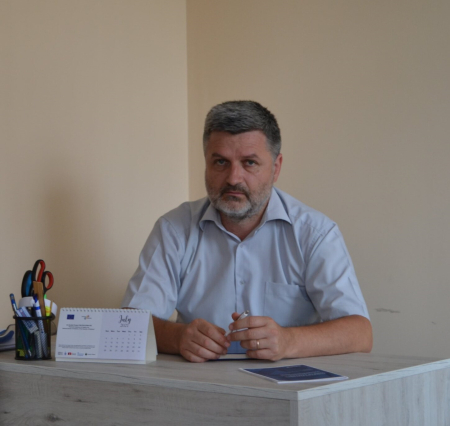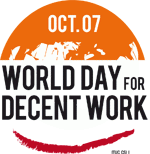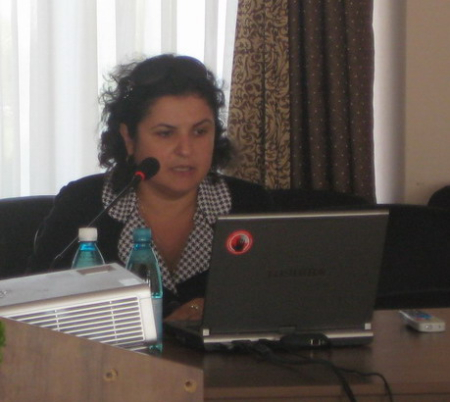Statistics-essential pillar of a democratic society

Statistics-essential pillar of a democratic society
 Interview with Ilie Dumitrescu, Counsellor and Chief of cabinet to the President of the National Statistics Institute NSI Romania, expert in the UN joint project "Strengthening the national statistical system", implemented with the support of the Government of Romania.
Interview with Ilie Dumitrescu, Counsellor and Chief of cabinet to the President of the National Statistics Institute NSI Romania, expert in the UN joint project "Strengthening the national statistical system", implemented with the support of the Government of Romania.
Mr. Dumitrescu, many people consider that statistics is a complicated and boring area. How this area can be turned into an attractive one, easy to understand?
In this regard it depends on a different way in which the so-called stakeholders in the statistical process, data providers, producers and users of data see it. Data providers feel the imposed load to provide initial data, primary data for those who produce aggregate statistical data. In their turn, data producers are required to produce the data in the form in which data users can use them, understanding the significance of indicators, the whole arsenal of statistical information that is offered. Therefore, the perception that the statistics is a closed, boring and annoying is explained by the fact that people think that it uses some extremely complicated, sophisticated, impenetrable methods. It is not exactly so. Statistics, statistical thinking, as H. G. Wells said, will become someday "just as needed by any socially useful citizen as writing and reading". Such visions are already reality at present. Why? Because there is practically no field that can go without statistics, or feel no need to use the statistics. Any kind of assertion , declarative or narrative in nature, be it political or purely scientific, has no value if it's not supported by figures and the figures must be credible. Credibility is one of the big problems of statistics at present. As the Republic of Moldova is coming more and more closely to the European Union, the task in the field of statistics becomes even more difficult. There is a clear obligation-statistics must be reliable, comparable, developed on scientific basis and in accordance with European standards. This requires, first and foremost, resources-resources of manpower and financial resources.
Romania can help us with harmonization practices towards Community statistical acquis because it already has travelled long on this way. What were the goals of the project on which you have been working together with your Chisinau colleagues?
Romanian is in a position to be preferred to other countries in supporting the statistics of the Republic of Moldova - at least in two ways. There is an essential language community, when discussions can take place unmediated and, therefore, the perception of the message is much easier. Secondly, Romania is still close to the time when the statistical system based on a planned economy was transformed into the one used in the democratic world. We have been called to support the Republic of Moldova in this project, in particular the Regional Development Agencies, to support in using the statistics and learn how the statistics is used in development of strategies for the whole countries and especially for various regions. The seminars (four in total) included practical exercises, teaching the participants, for example, on what methodologies and indicators should be used , what an absolute, relative indicator was, and what was their significance. The participants also learned how the elements related to lack of available data, insufficiently reflected through certain indicators can be tackled.
In this context, can we talk about achieved targets?
We can talk about the fact that in the context of any social and economic approach, the description of the existing situation status-quo is extremely important. This refers to the arsenal of figures and credible and relevant statistical information. IN strategies we've seen here, the ones that cover the period 2012-2016, the amount of information and statistical data with reference to the current state accounts for 75 percent, may be even more. That’s why the essential elements on which we focused during our training are extremely important. The Moldovan specialists will be able to more easily conclude and access the ways of rendering the current situation in such areas as social, economic, environment, etc., the purpose being to reduce the extent in which Moldovan specialists resort to international specialists to accomplish strategies in one area or another.
What is your opinion on the availability of statistical data and information within the framework of the National Bureau of Statistics of the Republic of Moldova?
In relation to the resources of the National Bureau of Statistics, the results are surprisingly good, surpassing expectations, as compared to what others, much better equipped in terms of resources, have. When I say this I refer especially to the national level, but also the local level.
What should be improved in terms of regional statistics?
Securing data at regional level should be a greater concern. Here there is a kind of dilemma, respectively, two regional statistical structures- development regions on the one hand, and statistical areas, on the other hand. These two do not overlap. At the regional level, one of the largest gaps that I see is that the synthetic indicator which represents the quintessence of the place and role of a certain region, a specific segment in the economy of Moldova, is not yet available, namely the regional Gross Domestic Product. Because the GDP, as it is known, is the barometer of economic growth, a credible measurement of the effort made in this area.
To what extent the existing statistics in the NBS data bank, in statistical publications and other dissemination formats comply, from methodological standpoint, with international practice, in particular with EU norms and standards?
As in any area, everything can be perfected, and requires constant improvement and modernisation. For what the current status of Moldovan statistics is, I think it's fine. The Republic of Moldova has benefited from foreign assistance in this respect. The Nordic countries have provided support and of course Romania has been able to do it and did it to the extent of its capacities, and , why not, with all its heart, so that statistics become of high value and comparable.
To what extent the technical assistance provided can practically build the capacity of the Moldovan statisticians?
It can, sure it can, however, there is a problem the statistics faces - the absorption capacity. You have capable, open, clever, shrewd, and very hardworking people in statistics. It is known that if you're not devoted to statistics, you do not belong here. This is the place where one should respond and think from the very beginning because you enrolled in an area where consistency, everyday work is absolutely essential. The absorption capacity is limited because the number of specialists is limited. At the central level, as far as I know, the Moldovan statistics has approximately 120 employees . The figure is below the level of any EU member countries, including small states, such as the Baltic countries. It's just an opinion, but I think it should be taken into account, and because it is a necessity of the moment, with the transition to development of strategies in accordance with European standards and norms.
In conclusion, how do you assess the results of the training activities, carried out under the UN joint project "Strengthening the national statistical system"?
From my point of view ,as a person who has taken active part in the training process, I think that the Moldovan regional development specialists know, from this point on, much better how to use statistical data, where to use it and about the indispensability of using statistical data as an absolute need in any endeavour. I could read an increased interest for the field of statistics on the participants faces. I think that this interest will be maintained and even increased so that we will do things where statistics can prove its purpose for which it was created-to underlie micro and macro economic decisions. Statistics is one of the essential pillars of a democratic society.
About the project: the project contributes to strengthening the national statistical system by improving the collection, production, dissemination and use of statistical information in the economic and social fields. It helps to harmonization of official statistics to international standards and to improving availability, quality and use of disaggregated statistical data (regional statistics in particular ) to strengthen the participatory policy making process.
Interview with Ilie Dumitrescu, expert in the UN joint project "Strengthening the national statistical system".
- Report a mistake. Select the desired text and press CTRL + ENTER




